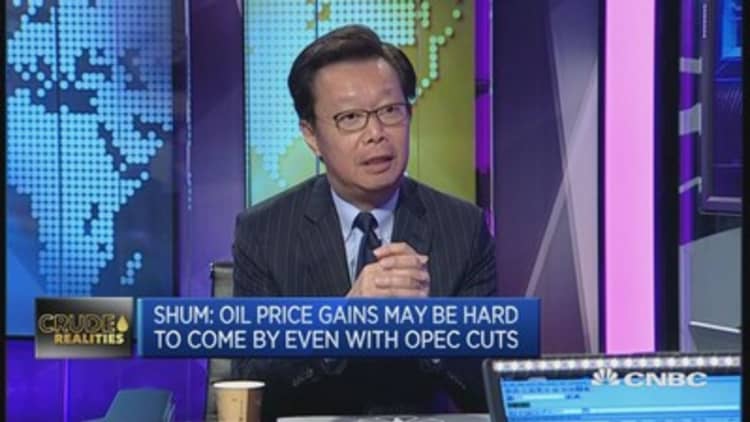
OPEC mostly kept its members in line during the first month of coordinated production cuts, but the cartel faces a test of its will this spring.
The Organization of the Petroleum Exporting Countries in January managed to cut about 90 percent of the 1.2 million barrels it promised to remove from the market last year, according to S&P Global Platts and others that track shipments. Those efforts have helped stabilize global oil prices above $50 a barrel.
However, OPEC members have a long history of cheating on quotas. They are likely to flout the agreed-upon cuts as the summer driving season sends prices higher, said Victor Shum, who leads IHS Energy's oil market consulting practice in Asia.
"Output will likely increase. There's going to be a slippage in compliance," he told CNBC Asia's "Street Signs."
OPEC probably will extend the six-month deal if prices remain near or above current levels, Shum said. But if prices falter, "all bets are off" as oil exporters start pumping to boost government revenues.
Jim Krane, a fellow at Rice University's Baker Institute, noted that Saudi Arabia, Iraq and Kuwait still burn crude to meet summer electricity demand.
"It'll be tougher for the Saudis and some of the other Gulf producers to hold production steady during the late spring and through the summer," he told CNBC in an email. "Other producers will be tempted to try and meet surging summer demand rather than hold the line and allow prices to increase."
Helima Croft, global head of commodity strategy at RBC Capital Markets, takes a different view.
The cuts will continue, because the influential Gulf Cooperation Council spearheaded the deal for its own political and economic reasons, according to Croft. Saudi Arabia, for example, needs higher prices as it prepares to sell a stake in state oil giant Saudi Aramco in 2018, she said.
"Yes, you could maybe have an Angola fall off, but I think the core GCC powers this decision through," she told CNBC.
Many OPEC members ran out of spare capacity last year, Croft said. That means they could not pump enough new oil to make up for the declining value of crude — and its impact on state coffers.
They could restore some of the production they've cut recently, but they would soon find themselves back at square one. Croft thinks OPEC will extend the deal at midyear if prices threaten to fall below $50 a barrel.
Producers will actually have an easier time cutting output in the coming weeks, said John Kilduff, founding partner at energy hedge fund Again Capital. That's because the oil market is entering a seasonal period of low demand that runs from March through May.
Demand doesn't typically rise until mid-May, just as OPEC is about to hold its midyear meeting.
"If [prices are] slipping, there's a great incentive to continue to stabilize the market," Kilduff said.


